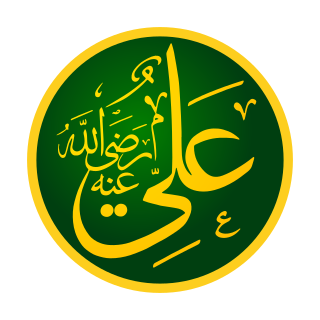Fatima is a female given name of Arabic origin used throughout the Islamic world. Several relatives of the Islamic prophet Muhammad had the name, including his daughter Fatimah as the most famous one.

Ali ibn Abi Talib was the cousin and son-in-law of Muhammad, the last prophet of Islam. He ruled as the fourth caliph from 656 to 661, but is regarded as the rightful immediate successor to Muhammad as an Imam by Shia Muslims.
Fadak was a garden oasis in Khaybar, a tract of land in northern Arabia; it is now part of Saudi Arabia. Situated approximately 140 km (87 mi) from Medina, Fadak was known for its water wells, dates, and handicrafts. When the Muslims defeated the people of Khaybar at the Battle of Khaybar; the oasis of Fadak was part of the bounty given to the Islamic prophet Muhammad, who gifted it to his daughter, Fatimah. The Sunni view is that it was not given to anyone, but preserved for the maintenance of Banu Hashim. Fadak is said to have became the object of dispute by a group of Muslims between Fatimah and the caliph Abu Bakr after Muhammad died.

Zaynab bint ʿAli was the daughter of the Ali ibn Abi Talib and Fatimah bint Muhammad. The Islamic Nabi Muhammad was her maternal grandfather, and thus she is a member of his Bayt. Therefore, she is often revered not only for her characteristics and actions, but also for her membership in, and continuation of, the biological line of Muhammad. Like other members of her family she became a great figure of sacrifice, strength, and piety in Islam – in the Sunni and Shia sects of the religion.

Alī ibn Abī Tālib was an early Islamic leader. Ali is revered by Sunni Muslims as the last of the four Rightly Guided Caliphs, and as a foremost religious authority on the Qur'an and Fiqh. Shi'a Muslims consider him the First Imam appointed by the Islamic prophet Muhammad and the first rightful caliph. Ali was the cousin of Muhammad, and after marriage to Fatimah he also became Muhammad's son-in-law. His descendants through Fatimah are revered today in Shia Islam as Imams, Sharifs or Sayyids.
The Hadith al-Thaqalayn, also known as the Hadith of the two weighty things, refers to a saying (hadith) of the Islamic prophet Muhammad. According to the hadith of the Prophet Muhammad; the Qur'an and Ahl al-Bayt had been described as the two weighty things. In the context of this Hadith, Muhammad's family refers to Imam Ali ibn Abi Talib, Fatimah bint Muhammad, and their children and descendants. This hadith is accepted by Shia and Sunni Islam.

There is a small Muslim community in El Salvador, largely consisting of Yemeni Arabs. However, the majority of the Palestinian Arab population in the country are Christian. It is estimated that there are about 1000-1500 Muslims in El Salvador

Fātimah bint Mūsā al-Kādhim, commonly known as Fātimah al-Ma‘sūmah or Fatemeh Ma'sumeh, Masuma-e-Qum, and Hadrat Masumah, was the daughter of the seventh Twelver Shī‘ah Imām, Mūsā' al-Kādhim and sister of the eighth Twelver Shī‘ah Imām, ‘Ali ar-Ridhā. Every year, thousands of Shi'i Muslims travel to Qom to honor Fatima Masumeh at her shrine.
Khadijah bint Khuwaylid, the first wife of the Islamic prophet Muhammad, had six children. Some Shi'ites dispute whether all of the children were born in her marriage to Muhammad, or if three of the four daughters were actually the daughters of Hala Bint Khuwaylid, her sister.

The Book of Fatimah, Mushaf of Fatimah, or Fatimah's Mushaf is, according to Shia Islamic tradition, a book written for Fatimah, the daughter of the Islamic prophet, Muhammad.

According to Shi'a and non-Muslim scholars, Fatima Zahra was Muhammad's only daughter. The Sunni belief that he had other daughters by Khadijah denies Ali ibn Abu Talib the distinction of being Muhammad's only son-in-law. She is held in highest of esteem, as being the single most ideal example for all women; in terms of her purity and the eventual martyrdom of her son, she is considered to be the Muslim counterpart to the Christian Mary, mother of Jesus; indeed, one of her names is Maryam al-Kubrá, or "the greater Mary".
Qur'an 17:26 is the twenty-sixth verse of Al-Isra, the seventeenth chapter of the Qur'an, which relates to the controversies of the land of Fadak in modern-day Saudi Arabia.

Fatimah bint Muhammad was the youngest daughter and, according to Shia Muslims, the only child of the Islamic prophet Muhammad and Khadijah who lived to adulthood, and therefore part of Muhammad's household. Her husband was Ali, the last of the Rightly Guided Caliphs, and her children include Hasan and Husayn, the second and third Shia Imams, respectively. She is the object of love and respect of Muslims, as she was the child closest to her father and supported him in his difficulties, was the supporter and loving caretaker of her own husband and children, and was the only child of Muhammad to have male children live beyond childhood, whose descendants are spread throughout the Islamic world and are known as Sayyids.
Eid-e-Shuja', also known as Eid-e-Zahra, is a ritual festival observed by most Twelver Shi‘a Muslims. It marks the end of the two-month mourning period (azadari) after the events of the Karbala massacre, which occurred in 680 AD. It is celebrated annually on the ninth day of the month of Rabi' al-Awwal in the Islamic-Hijri calendar.
The female given name Zahra is a common name which corresponds to three different, though related, meaning depending on the country it is being called.

The burial place of Fatimah is a disputed issue among different sects of Muslims. Fatimah was a daughter of the Islamic prophet Muhammad and Khadijah, wife of ‘Ali ibn Abi Taleb, and mother of Al-Hasan and Al-Husain. Ali buried his wife in an unknown location, according to Fatimah's decision with the aim of expressing her anger towards the caliph of the time. Different locations have been mentioned as the possible burial place of Fatimah. Some of them are said to be nearer to fact: Al-Baqi', her house and between Muhammad's tomb and his minbar.

Sermon of Fadak is Fatimah's speech in the Islamic Prophet Muhammad's Mosque. Fatimah Zahra delivered this sermon in the presence of Umar, Abu Bakr and a group of Muhammad's Companions who had gathered in Muhammad's Mosque. She entered the mosque with group of women and her trusted servant. Fadak was part of the bounty given to Muhammad. Much before his death, he bequeathed it to Fatimah. Nevertheless, soon after Muhammad’s death, it was taken from her by Abu Bakr’s order, and they also let out all the persons who used to work there. Thus this land became an object of dispute between her and Abu Bakr.
Sayyidat Nisā’ al-‘Alamīn is a title of Fatimah given to her by her father, the Islamic prophet Muhammad. Ali, the first Imam of Shia and husband of Fatimah, called her by this title, too.

The Tasbih of Fatimah, commonly known as "Tasbih Hadhrat Zahra" or "Tasbih al-Zahra", is a special dhikr which is attributed to Fatimah bint Muhammad, and is included 34 times Allah-o-Akbar (Takbir), 33 times Alhamdulillah (Tahmid) and 33 times Subhanallah (Tasbih).








